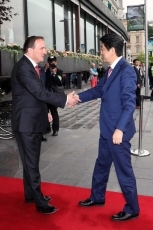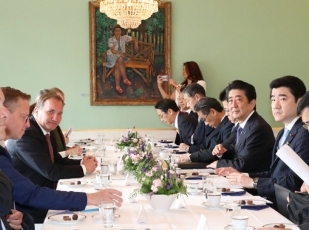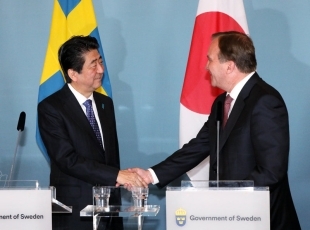Japan-Sweden Relations
Japan-Sweden Summit Meeting
 (Photo: Cabinet Public Relations Office)
(Photo: Cabinet Public Relations Office)
 (Photo: Cabinet Public Relations Office)
(Photo: Cabinet Public Relations Office)
 (Photo: Cabinet Public Relations Office)
(Photo: Cabinet Public Relations Office)
1. Beginning
(1) Prime Minister Abe extended his condolences to the victims of the terrorist attack that occurred in Stockholm in April. He firmly condemned despicable acts of terrorism and expressed solidarity. In addition, Prime Minister Abe explained that Japan attached importance to its relationship with Sweden, with which it shares fundamental values such as freedom, democracy, human rights and the rule of law, and stated that he would like to use this visit as an opportunity to further advance the two countries’ cooperative relationship in a broad range of fields toward the 150th anniversary of the establishment of diplomatic relations next year.
(2) In response, Prime Minister Löfven welcomed Prime Minister Abe’s visit to Sweden, and explained that he would like to further promote the cooperation between Japan and Sweden in such fields as innovation and women’s empowerment in particular. Prime Minister Löfven also stated that on the basis of the amicable bilateral relations, he would like to further develop the business field as well.
2. Bilateral relations
(1) Prime Minister Abe stated that he had felt honored to have an opportunity to hold an informal discussion with His Majesty Carl XVI Gustav, King of Sweden, who visited Japan in February, and mentioned that H.R.H. Victoria, Crown Princess of Sweden, visited Japan in April this year. He explained that the close relationship between the Imperial Family of Japan and the Royal Family of Sweden was the foundation of the friendly bilateral relations.
(2) Both leaders shared the view that they would promote cooperation in a broad range of fields including women’s empowerment and innovation toward the 150th anniversary of the establishment of diplomatic relations next year.
(3) With regard to the field of innovation in particular, on the occasion of this summit meeting a document was exchanged concerning cooperation between the Japan Proton Accelerator Research Complex (J-PARC) and the European Spallation Source (ESS) that was being constructed in Sweden.
(4) Both leaders shared the view that they would promote security and defense cooperation while continuing to explore approaches for information sharing in the security field as well as defense equipment and technology cooperation.
(5) Prime Minister Abe explained that the World Assembly for Women: WAW! would be held in Tokyo this year also, and the two leaders shared the view that they would continue to cooperate for the achievement of gender equality in the world.
(6) Both leaders shared the view that they would continue to earnestly pursue negotiations on an agreement between Japan and Sweden on social security in order to promote people-to-people and economic exchanges between their countries. Furthermore, they shared the view that they would accelerate negotiations on an agreement on a working holiday scheme that was currently being negotiated toward the 150th anniversary of the establishment of diplomatic relations in 2018.
(7) Prime Minister Löfven mentioned the promotion of cooperation with “Connected Industries,” Japan’s concept for creating new added value through a variety of connection, and the two leaders agreed to examine what they could do between the two countries.
3. Japan-European Union (EU) relations
(1) Prime Minister Abe stated that we must maintain a free and open international community based on rules. The two leaders confirmed the importance of Europe continuing to be a partner to engage with the challenges facing the international community together with Japan and the United States, as well as unified Europe proactively contributing to the peace and stability of the international community even after the United Kingdom (U.K.) leaves the EU.
(2) With regard to the U.K.’s exit from the EU, Prime Minister Abe explained that he was closely watching the U.K.’s negotiations to exit the EU, and requested the consideration for minimizing the impact of the exit on companies. Prime Minister Löfven replied that he was aware that a large number of Japanese companies were operating businesses in the U.K., and that he shared Prime Minister Abe’s concerns. Prime Minister Löfven explained that Sweden was also business-friendly, and could be an alternative location for establishing businesses.
(3) With regard to the Japan-EU Economic Partnership Agreement (EPA), Prime Minister Abe explained that the realization of the agreements in principle on the EPA and the Strategic Partnership Agreement (SPA) in the midst of protectionist moves sent a powerful message to the world demonstrating that Japan and the EU possess the strong political will to continue waving the flag of free trade high. The two leaders shared the view that on the basis of this outcome, they would continue to cooperate on promptly concluding these agreements.
(4) Prime Minister Abe requested cooperation for lifting the EU's restrictions on imports of foods from Japan including those from Fukushima Prefecture, and Prime Minister Löfven replied that he intended to respond properly.
4. Regional affairs
(1) With regard to the situation in the East China Sea and the South China Sea, the two leaders shared the view that they would continue to work closely together in order to maintain the international order based on the rule of law.
(2) With regard to North Korea, the two leaders confirmed the necessity to strengthen the pressure on North Korea given the ballistic missile launch by North Korea on July 4. Prime Minister Abe also requested understanding and cooperation on promptly resolving the abductions issue, and obtained Prime Minister Löfven’s support.
(3) With regard to Russia, Prime Minister Abe explained the recent Japan-Russia relations, and the two leaders confirmed they would coordinate in advancing policies toward Russia.

